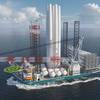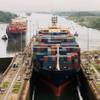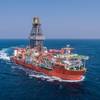Panama Canal Authority FY2009 Q3
The Panama Canal Authority (ACP) released third quarter (Q3) operational metrics for fiscal year 2009. In Q3, Canal Waters Time (CWT), the average time it takes a vessel to transit the Canal, including waiting time for passage, decreased significantly. Additionally, total transits and net tonnage decreased slightly. These metrics are based on operations from April through June 2009, the third quarter of the ACP's 2009 fiscal year, and are compared with Q3 of fiscal year 2008.
Average CWT decreased 47.9 percent – to 19.96 hours from 38.31 hours. CWT for booked vessels (those ships holding reservations) decreased 26.5 percent – to 14.53 hours from 19.77 hours. In Transit Time (ITT) also decreased 26.6 percent – to 9.55 hours from 13.02 hours. The ITT begins when a vessel enters the first set of locks at either side of the Canal and ends when the vessel departs the last set of locks at the opposite side. Efficient Canal operations and a slight decline in transits are likely causes for the decreases in CWT and ITT.
Total Canal transits decreased 6.4 percent – to 3,576 transits from 3,821. Transits of supers, larger ships that require greater time and navigation skills to transit the Canal, declined 1.5 percent – to 1,815 transits from 1,842.
With regard to key segments, dry bulk and tanker transits increased, while vehicle carriers, general cargo, container and refrigerated (reefers) transits decreased.
Panama Canal/Universal Measurement System (PC/UMS) tonnage remained nearly constant with a slight 4.6 percent decline – to 73.7 million PC/UMS tons from 77.2 million PC/UMS tons.
Utilization of the booking system decreased 44.3 percent – to 53.19 percent utilization from 95.51 percent.
“The ACP’s third quarter metrics confirm that the Canal remains a valued service in today’s fragile financial climate,” said ACP Executive Vice President of Operations Manuel Benítez. “This past quarter we had a decrease in booking system utilization. Overall, our operational figures fluctuated downward only slightly and we expect this trend to continue. We, at the ACP, are proud that the Canal continues to keep world trade moving safely, reliably and efficiently.”










